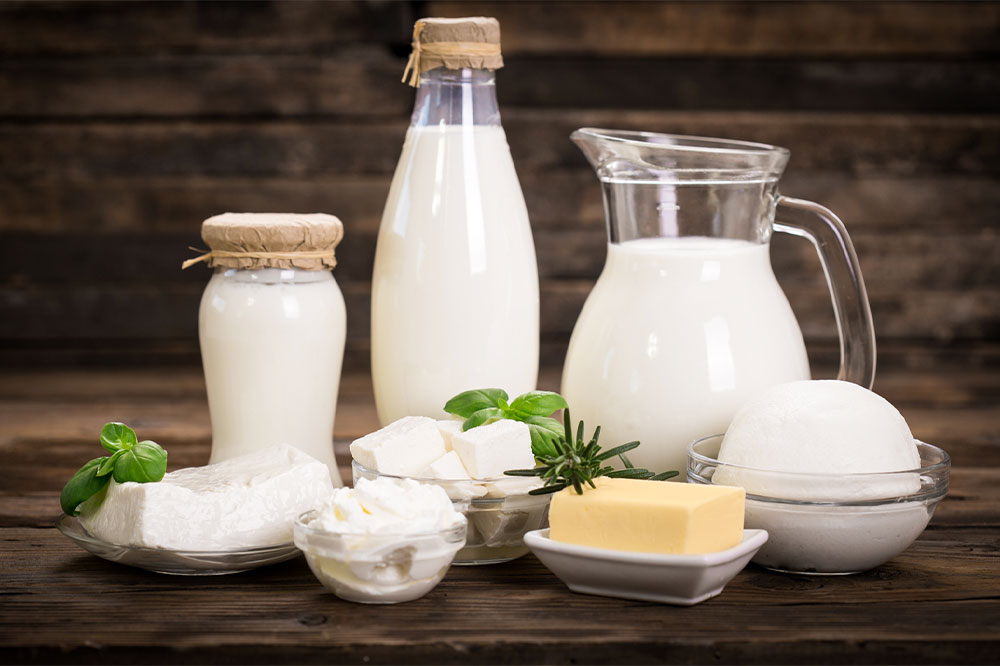
6 foods that lower the risk of osteoporosis
Osteoporosis affects the skeletal system. Usually, bones have small spaces that create a honeycomb-like structure. In the bones of people with osteoporosis, this space becomes bigger, and thus the bones become weaker. Over 53 million individuals in the country have osteoporosis. Nutrition holds the key to health, even in the case of osteoporosis, and some foods could lower the risk. Here is a list of foods that could lower the risk of osteoporosis:
Dairy
When mothers want their children to drink milk, they often talk about how the bones will become stronger. This is no urban legend. Bones are made of calcium, and when they become porous, what better way to fix it than to supply the body with the best source of calcium in meals? Calcium and essential proteins in dairy make milk and milk products vital to bone health. Also, cheeses are available in calcium-fortified variants, which helps reduce osteoporosis risk. For older individuals, yogurt and cottage cheese are a good option since milk often becomes hard to digest as people age. Finally, vitamin D fortified dairy also helps improve strength as this nutrient is essential for bone tissue.
Green leafy vegetables
Dark green leafy vegetables like broccoli, bok choy, turnip greens, and collard greens are a great choice to include in your meal plan because they contain vitamin K, several antioxidants, and are excellent sources of calcium and iron too. Apart from boosting overall health, all these nutrients protect against osteoporosis. Remember, however, that the entire range of the amaranth family has high amounts of oxalate that blocks the body’s ability to absorb calcium. Cooked spinach does not pose this problem, so remember to stay away from dark green salads and instead have them steamed or stir-fried.
Nuts and seeds
Macadamia nuts, hazelnuts, almonds, walnuts, pumpkin seeds, sesame seeds, and sunflower seeds contain calcium, magnesium, zinc, and other essential nutrients that improve bone health. Almonds and brazil nuts are particularly rich in calcium. Cashews contain folate, zinc, magnesium, and calcium, which are necessary for the bones. Walnuts are abundant in trace amounts of calcium, magnesium, vitamin D12, vitamin B6, phosphorus, and folate. Nuts also contain omega-3-fatty acids, which are healthy fats. These enable the storage of other essential nutrients and also help improve overall health. You can have them as snacks without fear of weight gain because they have few adverse effects. But it would be ideal to avoid salted nuts since their sodium interferes with calcium retention.
Salmon
Fish like salmon and sardines are best suited for the bones. Salmon packs a healthy dose of vitamin D, which helps the body absorb and process calcium, the raw material that makes up bones. It is amongst the few foods that naturally contain vitamin D. Salmon is full of protein, calcium, and omega-3-fatty acids, all of which keep inflammation away and promote bone health. The best part is salmon is a fish with low mercury levels, so you can consume it without worrying about harming your nervous system.
Eggs
Whether you like them sunny side up or poached, eggs are essential for bone health. Vitamin D is indispensable for calcium absorption and enables its optimal utilization in the body. Eggs are also rich in proteins necessary for rebuilding and repair in the body. When individuals with osteoporosis or at risk of developing the condition consume eggs regularly, their bones become stronger and healthier.
Phosphorus
Phosphorus supports bone building and tissue growth, and its intake can be beneficial to those at risk of osteoporosis. While not a food, this mineral is found in small amounts in various foods. Phosphorus is present in most dairy like milk, cheese and yogurt, meats, cereal, eggs, fish, and nuts. You can also take phosphorus supplements at regular intervals after consulting your physician.
However, while increasing the intake of these foods, it is also important to avoid foods that interfere with calcium absorption. Phytic acid in unleavened bread and raw beans, oxalic acid in raw spinach, and sodium in various foods interfere with calcium absorption and retention.
Foods to avoid
You can usually meet your nutrient needs by having a balanced nutritional regime that includes calcium-rich foods. But your body cannot absorb more than 500 mg of calcium at once. So remember not to take all your calcium in one meal. Consuming too many foods with added sugars can result in the excretion of calcium and magnesium through the urine. Cut down on pizzas, cold-cut meats, crackers, pretzels, and tacos as they contain excess sodium. Also, avoid alcohol because it interferes with vitamin D and calcium absorption. If you require to take a supplement to maintain your daily requirements, speak with your physician about what is most suitable for you.
Evenity
Unfortunately, osteoporosis is more common in women, especially after menopause. Estrogen has a protective effect on bones, and when its levels drop sharply after menopause, bone health suffers as well. However, there are particular options like Evenity that doctors prescribe specifically to women and those at high risk of hip fractures. Evenity is a prescription that’s usually given only when other treatments are unsuccessful. Evenity is administered as an injection under the skin of the stomach, upper thigh, or arms. The recommended dosage is 1 to 2 times per month for up to one year.